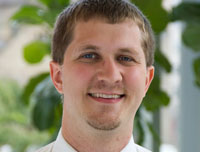
“What more impactful field is there than public health? Everyone wants and deserves to be healthy, so trying to help others achieve that desire is one of the most rewarding things anyone could do,” says PETER LEWELLEN, a Dean’s Scholar and Master of Health Administration (MHA) student in the Department of Health Policy and Management.
Lewellen, who originally hails from Manitowoc, WI, says his interest in health care was fostered from a young age by discussions around the dinner table with his physician father about insurance reimbursements and the politics of medicine. He decided he wanted to pursue a career in which he could “help people,” but didn't have a good grasp of how to attain the necessary skills or even which area of health care to go into.
A pre-med biology major at Duke University, Lewellen worked after graduation as an ophthalmic assistant, where he observed the effects of multiple professionals working together toward a common goal. “Working directly with patients gave me a better appreciation for the frustrations many felt regarding their insurance and long wait times, as well as their occasional feelings of helplessness due to their reliance on physicians to make the best decisions on their behalf,” he says. “I saw there was significant room for improvement in how health care is delivered.”
He recalls one incident at the ophthalmic office that had a major impact on steering him toward a career in health policy and management. Two adjacent rooms housed medical equipment; one contained a rarely used machine for a type of visual field test, and the other contained an optical coherence topographer and an apparatus for fluorescein angiography, both of which were used frequently. Operating one of the machines in that room prevented the use of the other, which resulted in long wait times for patients and a scheduling nightmare for the assistants. Meanwhile, the other room often sat unused. Lewellen suggested to the office manager that they switch the equipment to split up the frequently used machines, and patient wait times diminished significantly.
When he chose to attend graduate school and earn his MHA, he was drawn to Pitt Public Health, particularly because its summer residency requirement doesn’t necessitate spending three months in a hospital across the country—there are an abundance of opportunities right in Pittsburgh.
“My wife and I had suffered through a similar arrangement during her education, and we didn't want to be apart like that again,” he says. “Pittsburgh has such a vibrant health care community that students can nearly always find an opportunity in the area, and Pitt facilitates the process. Not having to pay rent in two cities at once is a nice bonus.”
Furthermore, Lewellen cites Pitt Public Health’s competitive extended residency option in which students begin their residency experience in January of their first year and continue it throughout the second year, putting in the standard three months of full-time work during the summer: “The ability to see projects through to completion in the extended residency was a major selling point to me as a way to gain valuable experience.”
Accepted Applicants Day sealed the deal for Lewellen. He says when he attended the event in March, he was still deciding between Pitt and another school, but after meeting a few of the professors and some current students, he became convinced of the quality of the MHA program. Now a little more than a month in, he believes he made the right decision.
“Pitt Public Health has exceeded my expectations so far,” he says. “The MHA coursework has been challenging but stimulating, and I have already learned a lot.” He says he appreciates the numerous available opportunities for professional improvement and networking, as well as that his classmates are teamwork oriented. In addition, “Each of us has been paired with a mentor in the field, and from what I can tell great care was taken to make sure that they are relevant matches.”
Because of his experience with the equipment in the ophthalmic office, Lewellen is also pursuing the department's Health Systems Engineering Certificate with the Swanson School of Engineering. It will focus on process improvement using industrial engineering principles such as Lean Six Sigma.
“While health care is a very diverse field with many complexities, I believe there is a great deal of room for improvement using some of these techniques,” he says.
10/05/2016